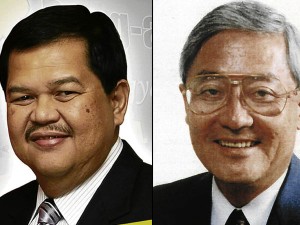The camp of businessman Roberto Ongpin on Wednesday branded as “lame” the defense of the Bangko Sentral ng Pilipinas that it did not reject the businessman’s directorship in Philippine Bank of Communications but merely “deferred” action on the issue.
In a statement, the legal counsel of the former Marcos trade minister said the decision of the BSP’s Monetary Board to defer action on his appointment “was essentially contingent on the resolution of the criminal cases ‘allegedly’ filed with the Office of the Ombudsman.”
“This could take months, if not years to resolve,” he said. “The Monetary Board action therefore effectively prevented Mr. Ongpin from being confirmed as director and co-chairman of PBCom indefinitely.”
The tit-for-tat exchange of barbs came a day after the BSP called Ongpin’s allegations of partiality on the part of the regulator “unwarranted and patently unfair,” saying that the central bank “has the responsibility to ensure that careful evaluation of critical elements is made before final decisions are promulgated.”
“For the record, the Monetary Board [of the BSP] has not denied but simply deferred Mr. Ongpin’s confirmation pending completion of assessment of certain material information,” the BSP said.
The bank regulator added that the AMLC’s freeze order came after the Court of Appeals found probable cause to act against Ongpin.
But Ongpin’s camp said the businessman—who is being accused of receiving preferential treatment in receiving a P550-million loan from the state-owned Development Bank of the Philippines (an amount already fully repaid)—used the word “deny” in his letter to the Monetary Board.
“In its statement, however, the BSP obviously and deliberately misquoted Mr. Ongpin in order to try and make their case,” it said.
The businessman sold his stake in PBCom to his nephew Eric Recto last week in a move, he said, meant to insulate the bank from his worsening row with the BSP and the Anti-Money Laundering Council, which had imposed a freeze order on his bank accounts in early December 2012.
The AMLC is chaired by the BSP chief, but since Governor Amando Tetangco Jr. was abroad on official business when Ongpin’s issue was tackled, the freeze order was authorized by Tetangco’s alternate, BSP Deputy Governor Nestor Espenilla Jr.
Ongpin said he would sue Espenilla for his act of ordering the freeze on his bank accounts despite the latter having testified before the Senate in 2011 that the controversial DBP loans were above board and resulted in profits for the bank.
“The criminal suit is being directed at Deputy Governor Espenilla precisely because of the contradictory positions he took on the matter,” the statement said. “During the Senate hearings in 2011, Mr. Espenilla stated under oath that Mr. Ongpin’s transactions with DBP regarding Philex shares were ‘positive’ for the bank. Interestingly, the BSP news release did not address this particular issue (which is of paramount importance), because there simply is no defense against it.”
Ongpin took note of BSP’s defense, saying that the AMLC’s freeze order was based on the resolution of the Office of the Ombudsman against him, but noted that a careful reading of the resolution would show that the Ombudsman did not rule that Ongpin committed any crime when he acquired DBP’s Philex shares.
“Instead [the Ombudsman] indicted Mr. Ongpin for the loans DBP extended his company to finance a small fraction of the price of those shares,” he said. “However, it is undisputed that Mr. Ongpin has fully repaid those loans and it was irresponsible for AMLC to misrepresent to the Court of Appeals that their proceeds were in his bank accounts and that therefore those accounts should be frozen.”
The statement added that the businessman also intended to sue AMLC executive director Vicente Aquino “whom the BSP statement in effect has identified as having participated in the damage done to Mr. Ongpin.”
